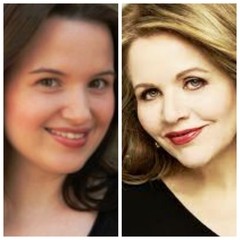|
Back
From the Gardens to the Tombs New York
David Geffen Hall, Lincoln Center
02/20/2020 - & February 21, 22, 2020
“Project 19”
Ellen Reid: When the World As You’ve Known it Doesn’t Exist (World premiere)
Anders Hillborg: Dark Harbor XXXV – Dark Harbor XI
Björk (Orch. H. Ek) – Virus – All is Full of Love
Anton Bruckner: Symphony No. 4
Renée Fleming, Eliza Bagg, Martha Culver, Esteli Gomez (Sopranos)
New York Philharmonic Orchestra, Jaap van Zweden (Conductor)

M. Glover/R. Fleming (©Courtesy of the Artist/
“God has chosen me from thousands and given me, of all people, this talent. It is to Him that I must give account.”
Anton Bruckner (1824-1896)
“When the UN asked Icelandic people what we believe, 90% of us, including me, said, 'ourselves'. If I get into trouble, there’s no God or Allah to sort me out. I have to do it myself.”
Björk (1965)
With Renée Fleming’s very first notes of Anders Hillborg’s Dark Harbor XI, listeners at last night’s New York Philharmonic concert were transported to another world. Some might have scoffed to hear a song which could have been written by Barber or Copland or even from Carlisle Floyd’s Susannah. Yet one could never scoff at such an unalloyed gorgeous creation.
Ms. Fleming did offer three other songs, each a splendid homage to her voice (she chose the Mark Strand poems for the composer), and the opening work by Ellen Reid was equally enthralling. But oh! What a magnificent work was this second of Mr. Hillborg’s Strand Settings.
Conductor Jaap van Zweden gave us a bipolar concert this week. The illness was revealed after the intermission. Yet the five works of this first half shared a wonderland which, eschewing the slightest sentimentality (with one exception), were woven from one silken cloth.
The Phil’s “19” theme this year is based on the centenary of the 19th Amendment to the Constitution, so two of the first three composers were women. Mr. Hillborg, though, is a composer of ever-changing musical genres, and the two pieces written for Ms Fleming could have been woven from any sex. In fact, Anders Hillborg and Renée Fleming have a visceral identity. Her voice, his music have no barriers between notes and effects, the effects of these two Mark Stroud poems.
The first was about “kisses”, yet these were neither wet nor sensuous. They were kisses from heaven, from “asleep in the shade of each other”, the glory of “death without echoes.”
They were dramatic kisses, and Ms. lFleming, always on the opera stage, gave dramatic meaning to each line, even the final whisper.
In Dark Harbor XI, she sung of lovers safe from the elements, of the past, with music which, yes, had an atmosphere both sinister and inviting.
To finish, Ms. Fleming–whose life started in jazz–worked with two songs by an equally cryptic mysterious artist, Björk. Two songs orchestrated with telling sensitivity and sung with a delicate voice always sure, always on tonal–and emotional–pitch.

E.Reid/Björk
Ellen Reid introduced her own When the World As You’ve Known It Doesn’t Exist (a title which could have come from William Gibson!), but the orchestra and the vital wordless singing by three women needed no introduction.
The work began with divided violins swooping down and swooping up with the orchestra, bringing in the women and becoming quiet before ending with the first measures again. This was mesmeric music except for some sentimentality toward the end, transforming “The Non-Existing World” to E.E.Cummings “The Universe Next Door”.
Still, this was Ms. Reid’s conception, and her execution was sustained for ten enchanting minutes.
This first half was enchanting. For the second half, Mr. van Zweden precipitously extinguished whatever enchantment we had experienced.
Anton Bruckner’s Fourth Symphony has its place, of course. But the first 45 minutes of the concert we had strolled through gardens and floated among cirrus clouds, wading across dangerous brooks, through wordless clusters by three Sirens, golden words by Renée Fleming into the unfathomable moments of our mind.
Bruckner’s Symphony banished us from our natures and knocked us to stone, a 100-foot-high black-lava mausoleum in a dark cave, a silhouette against a midnight Medieval sky. Inescapable from its grim ornamental architecture for over an hour.
Mind you, I do like Bruckner. But after the magical first half, this was a doleful, almost vindictive choice, as if Mr. van Zweden had thought, “Two hurrahs for that pretty music. Now let’s get serious with Schopenhauer.”
Nor did the New York Philharmonic rise to the occasion. The horn solos were ragged, and the first movements were rather sluggish. With a brisk scherzo–though one fears Björk would have shied away from a hunt for stags–and a heroic enough finale, Mr. van Zweden gave the equivalent of a monumental classic.
The evening, though, was not meant for monuments. It was meant for storms and starlight. Departing, this mind happily recalled those first measures of Ms. Reid’s ten-minute dream, and Ms. Fleming’s enrapturing lyrical poetry.
Harry Rolnick
|